Toshinobu "Toshi" Kubota is a Japanese singer, songwriter, musician, music producer, and radio personality. He has produced six million-seller records and thirty-three Top 40 singles during his career. Kubota is currently part of Sony Music Japan. In addition, he has composed and written songs for many singers including Hiromi Iwasaki, Misia, Toshinori Yonekura, Kyōko Koizumi, and many other recording artists.

Raphael Saadiq is an American singer, songwriter, multi-instrumentalist, and record producer. He rose to fame as a member of the multiplatinum group Tony! Toni! Toné! In addition to his solo and group career, he has also produced songs for such artists as Erykah Badu, Jill Scott, Stevie Wonder, Beyoncé, Total, Joss Stone, D'Angelo, TLC, En Vogue, Kelis, Mary J. Blige, Ledisi, Whitney Houston, Solange Knowles and John Legend. Music critic Robert Christgau has called Saadiq the "preeminent R&B artist of the '90s".

The 47th Annual Grammy Awards were held on February 13, 2005, at the Staples Center in Los Angeles honoring the best in music for the recording of the year beginning from October 1, 2003, through September 30, 2004. They were hosted by Queen Latifah, and televised in the United States by CBS. They recognized accomplishments by musicians from the previous year. Ray Charles, whom the event was dedicated in memory of, posthumously won five Grammy Awards while his album, Genius Loves Company, won a total of eight. Kanye West received the most nominations with ten, winning three. Usher received eight nominations and won three including Best Contemporary R&B Album for his diamond selling album Confessions. Britney Spears received her first Grammy of Best Dance Recording for her 2004 smash hit "Toxic".
Joi Cardwell is an American singer and songwriter. Born and raised in New York City, she performed in various singing competitions as a child and rose to fame in the early 1990s as a guest vocalist for Lil Louis on the number 1 Dance singles "Club Lonely" and "Saved My Life". The release of Cardwell's debut album, The World Is Full of Trouble (1995), established her as a solo artist worldwide and featured the Billboard Dance top-five singles number-one singles "Jump for Joi" and "Love & Devotion". Her second album, Joi Cardwell (1997), spawned the top-charting singles "Soul to Bare", "Run to You", and "Found Love".

Toshimitsu Deyama, known exclusively by his stage name Toshi, is a Japanese singer and songwriter who is the lead vocalist and a co-founder of the rock band X Japan, who rose to prominence in the late 1980s and early 1990s and is credited as founders of the visual kei movement. Toshi began an extensive solo career in 1992 before leaving X Japan at the end of 1997. Toshi laments he was "brainwashed" by a group called Home of Heart, whose leader would control his musical output for the next 12 years. In 2007, X Japan reunited and began a world tour. Toshi severed ties with Home of Heart in January 2010 and renewed his solo career. His distinctive, impassioned tenor vocals have been compared to those of Steve Perry. In January 2018, he began to use the stage name Ryugen Toshi.

Mary is the fourth studio album by American singer Mary J. Blige, released August 17, 1999, on MCA Records. The album debuted at number two on the Billboard 200 chart, selling 239,000 copies in its first week. It spent 57 weeks on the chart and produced five charting singles. Upon its release, Mary received acclaim from music critics. It has been certified double platinum by the Recording Industry Association of America for sales of two million units in the United States.

Instant Vintage is the 2002 debut album by American R&B singer and record producer Raphael Saadiq. It was his first full-length solo album after spending much of his post-Tony! Toni! Toné! career as a session player and producer. The record was a critical success but underperformed commercially, leading to Saadiq's departure from Universal Records.
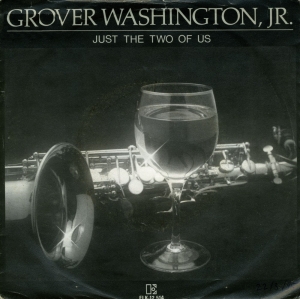
"Just the Two of Us" is a 1980 song written by Bill Withers, William Salter, and Ralph MacDonald, and recorded by Grover Washington Jr. with Withers on vocals. Elektra Records released it in Washington's 1980 album Winelight and as a February 1981 single.

David Archuleta is the debut album by American singer David Archuleta. It was released first released in the US on November 11, 2008, by Jive Records. The album was certified gold by the RIAA on January 29, 2009. The first single, "Crush", was released to radio on August 1. The album was released in the UK on May 11, 2009. The UK album release was set to coincide with his UK tour with Rock/Pop band McFly in April/May 2009.
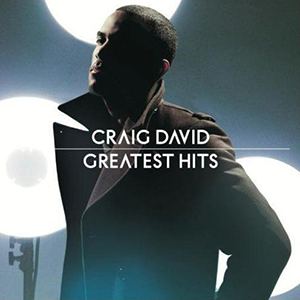
Greatest Hits is Craig David's first greatest hits album and was released on 24 November 2008. It contains three new songs, "Where's Your Love", "Insomnia" and "Just My Imagination". "Officially Yours" and "Unbelievable" are the only two singles previously released by David not to feature on the album.
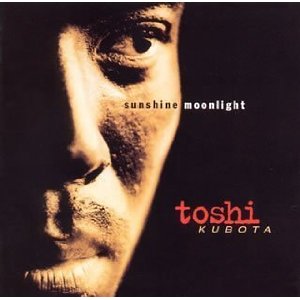
Sunshine Moonlight is the eighth studio album of Japanese singer Toshinobu Kubota, released on September 5, 1995. The album credited under the name, Toshi Kubota. This was also Kubota's first English-language album. The album's musical style ranges from 1980s–90s R&B and pop to funk elements such go-go. Synth instrumentation was not employed in recording most of the song as the album contains live instrumentation.

La La La Love Thang is the ninth studio album of Japanese singer Toshinobu Kubota, released on December 2, 1996. The album has been certified triple platinum by the Recording Industry Association of Japan. It was also successful in international music markets and yielded two singles: "Niji No Grand Slam" and "La La La Love Song". Kubota then embarked on his first international concert tour in 1996, which he titled the Oyeees! Tour. A live album, Toshinobu Kubota Concert Tour '96: Oyeees!, was released which featured footage from the tour. As of February 2012, La La La Love Thang has sold over 840,000 copies worldwide.
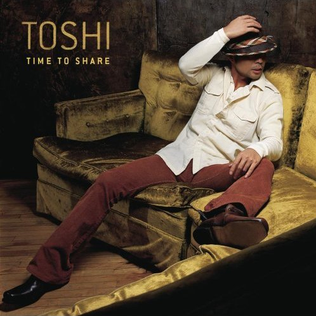
Time to Share is the thirteenth album from Japanese musician Toshinobu Kubota, released on September 21, 2004 under his alias "Toshi." It was Kubota's third English album.

Thought 'Ya Knew is the second solo studio album by American singer-songwriter CeCe Peniston, released on January 10, 1994, by A&M Records, and on February 10 in Japan. For this album, Peniston once again collaborated with Chicago-based producer Steve "Silk" Hurley, along with other producers Carsten Schack and Kenneth Karlin from Denmark, David Morales, Sir Jinx, and on one track also with the multiple Grammy Award-nominee Brian McKnight.
The discography of Japanese R&B singer Toshinobu Kubota consists of nineteen studio albums, ten compilation albums, two tribute albums, and over seventy singles. In 1985, Kubota signed with Sony Japan and began producing and writing songs for many of label's singers and groups. Under the label, Kubota released his first single, "Shitsui no Downtown" in June 1986, followed by "Time Shower ni Utarete" in December. Both songs were well received by radio, placing fifty-three and thirty-five on the Oricon Singles Chart. In September 1986, his debut album, Shake It Paradise, peaked at number twenty-two and remained on the Oricon Albums Chart for seven consecutive weeks. Shake It Paradise became certified million. The following year in 1987, Kubota's second studio album, Groovin', debuted at number thirty-three and was certified million. In February 1988, Kubota released "You Were Mine", which debuted at number two. In September 1988, Kubota released his third album, Such A Funky Thang!. The album peaked at number one and was certified million. The album also spawned the top-charted single "Dance If You Want It", which peaked at number three. In 1989, Kubota released his compilation album, The Baddest. The album also peaked at number one and was certified million.
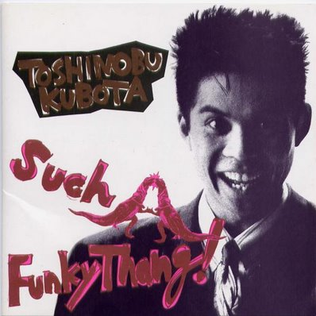
Such a Funky Thang! is the third album of Japanese singer Toshinobu Kubota, released on September 30, 1988. The album peaked at number one and was certified million. According to Sony Music Entertainment Japan's annual report, the album was Kubota's highest-selling album to date as well as the best-selling album in 1988 for CBS/Sony Group.
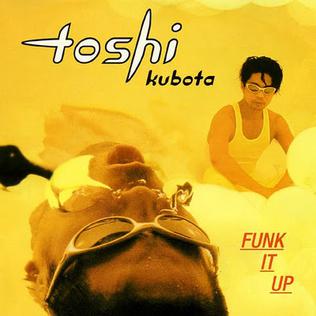
"Funk It Up" is a song recorded by Japanese R&B singer Toshinobu Kubota for his eighth studio album, Sunshine, Moonlight (1995). The song was written by Kubota and produced by Kubota, Kim Burse, Camus Mare Celli.

Kubojah: Parallel World I is the fifth studio album of Japanese singer Toshinobu Kubota, released on September 21, 1991.
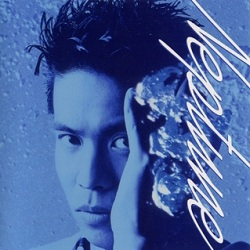
Neptune is the sixth studio album by Japanese singer Toshinobu Kubota, released on July 1, 1992. The album charted at number 3 on the Oricon Monthly Albums chart and remained on the charts for total of 13 weeks. The album sold a total of 484,000 units, reaching double platinum certification.

Bumpin' Voyage is the seventh studio album of Japanese singer Toshinobu Kubota, released on January 28, 1995. The album charted at number 1 on the Oricon Albums chart and remained on the charts for total of 12 weeks. The album sold a total of 600,000 units, reaching double platinum certification. In September 1995, Kubota re-recorded most of the album into English language and released the material on his eighth studio album Sunshine, Moonlight.














